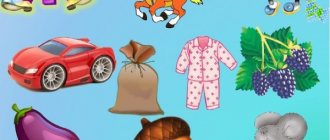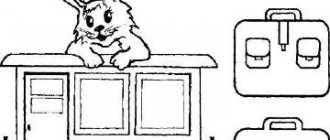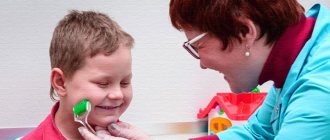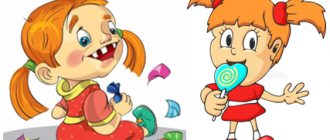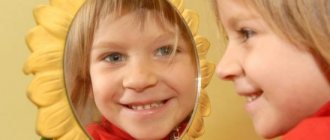After the stage of sound production, they move on to consolidating it in coherent speech. This is one of the most difficult stages, because you need to teach the child the skills of self-control of speech. The longer the incorrect pronunciation persists, the more difficult it will be to form the correct articulatory pattern. Automation of the sounds Ш and Ж and other phonemes that have similar characteristics is carried out separately. This is done to prevent their mixing.
It is worth moving on to the automation stage only after the child has managed to pronounce the desired sound correctly in isolation. After pronunciation is established, they move on to practicing it in syllables. All work on fixing sound in coherent speech is based on the principle of gradual complication of speech material.
Working with sound in syllables
Automation Ш, Ж in syllables is carried out in the following order:
- straight lines (SHA, ZHA, etc.);
- reverse (ASh, etc.), the sound Ж in these syllables is not practiced, because it is “stunned”;
- between vowels (ASHA, AZHA, etc.);
- with a combination of consonants (SHKA, ZhDA, etc.).
Tasks for children to reinforce sounds must be accompanied by visual material. Be sure to do articulation gymnastics at the beginning of the lesson to prepare the speech apparatus.
Isolated pronunciation is added to the practice of phonemes in straight syllables. Speech material is also gradually increased in volume: when moving on to a new type of syllables, first add 1-2 tasks with already worked out combinations.
Examples of tasks
To consolidate the correct pronunciation of syllables, the speech therapist uses special paths, “walking” along which the child pronounces the desired combination of sounds. At the beginning of the work, the adult gives a sample of correct pronunciation, then pronounces the material together with the child. Then the baby repeats on his own.
Examples of syllabic tracks:
- SHA-SHO-SHU-SHI;
- ZHA-JO-ZHU-ZHI;
- SHA-ASH-SHU-ISH;
- AZHA-OZHO-ZHU, etc.
At this stage, pure tongues are used. They are aimed not only at practicing correct pronunciation of syllables, but also at gradually introducing sound into words.
Examples of pure talk:
- SHA-SHA-SHA - we bathe the baby;
- SHO-SHO-SHO - rest well;
- ZHA-ZHA-ZHA - we saw the Snake;
- ZHU-ZHU-ZHU - I look at the sun.
When automating a certain phoneme, especially at this stage, try not to use words that have a sound with similar characteristics. After the child correctly pronounces Ш and Ж in syllables, the speech material becomes more complex and the stage of consolidation in words begins.
Exercises for making hissing sounds in children
Sound pronunciation is formed in children from the first months of life. The baby pronounces vowels first, and this is an involuntary process. For up to three years, it can distort the sound of certain sounds. And by the age of five or six, before going to preparatory class, the baby should have a fully formed phonetic range.
Speech therapy sessions with a child
On the sound “sh”, speech therapy classes are usually often carried out in the older group of kindergarten. It includes:
- Identifying the problem using speech therapy materials and tables,
- Articulation gymnastics, staging and automation,
- Homework for the child so that the working moment goes more successfully and efficiently. It usually includes various exercises.
When the child has mastered the sound “sh”, you can move on to “zh”. Then the process of differentiating these sounds will be easier, since their articulation is the same. The baby will learn to distinguish where he hisses with calm vocal cords, and where he needs to add vibration.
Important ! As a rule, many children cannot cope with hissing words due to their replacement with “s”. It turns out to be a whistle instead of a hiss. It is worth paying attention to speech when pronouncing sounds. Many children can be helped by comparisons with the movement of a train or the flight of a bumblebee.
Any exercises in speech therapy to produce sounds begin with articulatory gymnastics. This helps prepare the device for proper operation and at the same time relax it.
Articulation gymnastics
In speech therapy classes starting with the letter “w,” articulatory gymnastics occupies a special place. It should be done 2-3 times daily for 5-10 minutes. It is best to stand near a mirror - this way the baby can immediately see his shortcomings and repeat correctly after the adult.
Articulation gymnastics during staging
Exercises:
- "Smile-pipe." Be sure to close your teeth and hold them in this position. Stretch your lips in a smile and fix them for 5 seconds, then stretch them forward into a tube - also for 5 seconds. Repeat 5-7 times.
- "It's hot - it's cold." Open your mouth as if it were hot, and then close it as if it were cold.
- "Pancake." Open your mouth, smile. Then put your tongue on your lower lip, remove it, and put it back again. Keep your mouth smiling.
- "Chatterer." Quickly move your tongue along your upper lip and play “bl-bl-bl.”
How to get into a speech therapy group in kindergarten
Working in words
You need to choose only those words that contain a practiced syllable. The work is carried out in the following order:
- the sound is at the beginning;
- in the middle;
- at the end.
Automation begins with words with forward and backward syllables. It is advisable to illustrate each name, invite toys to “visit” - all this will make the lesson not only more interesting, but also more effective.
Examples of exercises
Similar to the previous stage, in the first lessons the speech material is spoken by an adult, then together with the student, and then the child repeats it independently. Gradually, when there are more practiced words, the baby names them without prompting from the speech therapist.
At the stage of automation of phonemes in words, work is carried out in parallel on the development of phonetic-phonemic processes. The child is explained where the word has a beginning, middle and end. During the classes, word diagrams are drawn up and tasks for the development of auditory self-control are offered.
At the same stage of automation, the gradual introduction of the automated phoneme into coherent speech begins. They do this using the example of phrases, Ш or Ж can be either in one or in each word:
- Repetition of words:
SHA: ball, cap, puck.
SHU: noise, fur coat, joke.
JA: toad, heat, sting.
And in this way they select words for each practiced syllable.
- The child is asked to listen carefully to the words and correct the adult. An adult deliberately makes mistakes in the pronunciation of the automated sound in some words. This task is aimed at developing auditory control of speech.
- Add the desired syllable to make a word. Pictures are used with children of primary and middle preschool age to make it easier for them to complete this task. For example, given an image of a cap and the second syllable – PKA. The child needs to add a syllable from the proposed options (SHA).
- Repetition of words with two sounds Ш or Ж. For example: bump, panties, kidding, etc.
- Repetition of phrases: On W: grandfather’s checkers, new hat, funny joke, sewing machine.
- On F: a beetle is buzzing, an orange jacket, liquid jelly.
When the child manages to pronounce the sound in words correctly, they move on to a more complex stage of correctional work - automating sounds in sentences. This block is longer in terms of the proposed material, because it is a preparation for the introduction of an automated phoneme into coherent speech.
Speech material for automating hissing sounds
Automation of the sound Ш in pure tongues
Sha-sha-sha-sha-sha-sha - our Masha is good. Sha-sha-sha - sha-sha-sha - Masha washes the baby. Sho-sho-sho- Sho-sho-sho- Pasha writes well. Sho-sho-sho- Sho-sho-sho - we draw well. Shu-shu-shu- Shu-shu-shu - I write letters on the board. Shu-shu-shu- Shu-shu-shu - I write them well. Shi-shi-shi- Shi-shi-shi - the kids are playing. Shi-shi-shi- Shi-shi-shi - they have pencils. Ash-ash-ash- Ash-ash-ash is Misha’s pencil. Ash-ash-ash- Ash-ash-ash is a Mashin pencil. Osh-osh-osh- Osh-osh-osh - I look like my grandfather. Osh-osh-osh- Osh-osh-osh - I look like my grandmother. Whoosh, whoosh, whoosh, whoosh, whoosh, whoosh, daddy fixed our shower. Sha-sha-sha - no pencil. Sho-sho-sho - it’s good for us to walk. Shu-shu-shu - I sit and don’t rustle. Shi-shi-shi - the kids became quiet. She-she-she - the soul is happy. About Tanya
Sha-sha-sha-sha, Our Tanya is good.
Sho-sho-sho-sho, And he sings well. Shu-shu-shu-shu, Sings a song to the baby. Shi-shi-shi-shi, Kids love songs. Song to the baby
Sha-sha-sha, Sing with us slowly. Shu-shu-shu-shu, Let's sing a song to the baby. Shi-shi-shi, The reeds sang with us. Sho-sho-sho, It turned out well.
Automation of the sound Ш in proverbs
Wealth is like water: it came and went. A big ship has a long voyage. If you don’t go to the forest, you’ll freeze on the stove. Friendship is like glass: if you break it, you won’t be able to put it back together. In winter, a fur coat is no joke. If you don’t give your word, hold on, but if you give, be strong. There is no better friend than mother. If you hurry, you will make people laugh. Whoever you hang out with, that's how you'll gain. The quieter you go, the further you'll get. What goes around comes around. Murder will out.
Automation of the sound Ш in verses
Our Christmas tree is big! Our tree is tall! Taller than dad, taller than mom - Reaches to the ceiling. ***** A lazy cat doesn't catch mice. A lazy boy doesn't wash his ears. A lazy mouse will not dig a hole. The lazy boy doesn't like cleaning. A lazy fly doesn't want to fly. Lazy boy doesn't want to read! Tell the kindest old lady what to do, When the old lady’s hut is full of: Lazy cat, lazy mouse, Lazy fly, lazy boy. ***** In the silence of the forest, Whisper hurries towards Rustle. Whispers rush to Rustle, Whispers rustle through the forest. - Where are you going? - I'm flying to you. Let me whisper in your ear Shu-shu-shu and shi-shi-shi. Hush, rustle, don't rustle, prick up your ears - listen to the silence!.. ***** Shh-sh-sh. Hide quietly. Shhhh. Don't move a bit. They play hide and seek in silence - Only then will you not be caught. ***** The nimble hornet flew in, the hornet sat on a flower. The hornet will sit for a while and go on its way. ***** Masha loves to eat porridge, Masha tells Natasha: “Everyone should eat porridge, everyone needs porridge for children.” ***** Cockerel, cockerel, golden comb. Oil head, silk beard, Why do you get up early, sing loudly, Don’t let the children sleep? ***** Our Masha is good, Masha walks slowly, Our Masha is small, She is wearing a scarlet fur coat. ***** The mouse in the green mug made some millet porridge. A dozen kids are waiting for dinner. ***** In the kitchen, the cat is preparing flatbreads. Kitten Timoshka loves cakes. ***** Dasha is embroidering a bear, Masha is embroidering a mouse. ***** Two insects at the edge of the forest are sewing a pillow for the little mice. ***** Misha and Pasha are chasing the puck, Masha and Dasha are not interfering with them. ***** Mice walk along the edge of the forest, books under their arms. ***** Schoolboy, schoolboy, you are a strong man: You carry the globe like a ball. ***** Cockerel, cockerel! Give me a comb! Oh please! Ask! I'll comb my curls. ***** The rustle of the tires fades away, The mouse hour comes. At night let the mice feast: Hush, hush, hush, hush. (I. Tokmakova) Sparrow
- Sparrow, what are you waiting for?
You can't eat bread crumbs. “I noticed the crumbs a long time ago, but I’m afraid of an angry cat.” (A. Taraskin) Mice
Our mice are quieter than yours, They don’t rustle through the cellars.
Our mice don't come to you. Don't let yours come to us. (V. Stepanov) Birdie
Birdie under my window Builds a nest for children, Sometimes it drags straws in its legs, sometimes it carries fluff in its mouth.
Misha writes
Here are the kids, Masha, Misha.
Masha is smaller, Misha is taller. Misha is writing something to Masha. Guess what Misha writes. ***** Five guys live in a hut, Five are oiling near the edge of the forest. The butterflies have hats. The children have slippers. A mouse is like a mouse
A mouse is like a mouse, as big as an inch itself!
The mouse climbed onto the bag. She called the mice to her place. Let them rustle with grains! Let's rustle! Only the cats got in the way... (G. Lagzdyn) Grandmother
Our grandmother has enough worries: She knits and sews for Tanya and Natasha.
He reads books to them, sings to them before bed, and takes the kids for walks before bed. (Z. Aleksandrova) Mice
The little naughty mice are dancing, Some are on the cup, some are on the lid.
Hush, hush, hush, mice, don’t disturb your little brother’s sleep. (A. Starodubova) ***** Mishka Toptyzhka is making noise at the edge of the forest. A bump on the top of the poor bear's head. ***** Schoolboy Pasha writes: Hat, puck, porridge, Mouse, midge, joke, Chess, Teddy bear. ***** Masha has a kitten Timoshka, Misha has a mouse Totoshka. Totoshka and Timoshka cannot stop making at least a little noise. ***** We can’t find a fur coat, a hat and galoshes. These are the jokes our Mishutka has! Little Mouse and Mouse
The mouse whispers to the Little Mouse: “You keep rustling, you’re not sleeping!”
The mouse whispers to the mouse: “I’ll rustle more quietly.” (A. Kapralova) Little frogs
By the river, along the edge, Lazy frogs walked past the plowed fields To visit their grandmother.
(I. Demyanov) Mishka has cones
Throwing a stick on top of Mishka.
- Fall into the hat from the tree, big shot! A bump is a slap on the head. There were two cones at once. (E. Petrischeva) Stream
- Stream, where are you rushing?
- To the river, to the river, my baby! - Brook, when do you sleep? “I never sleep, baby.” (G. Vieru) Baker
I mix sand with clay like flour.
On a hot stone for dinner I bake: Pretzel for the nesting doll, flatbread for the clown, Gingerbread for the bear, gingerbread for the bunny. (G. Ladonshchikov) Daisies
I have pockets on my new dress.
These pockets have daisies embroidered on them. Daisies, daisies - like meadow ones. Daisies, daisies - just like alive. (M. Plyatskovsky) A horse is taking us. A horse
is taking us, a horse, a horse - Not shaky, not shaky, not shaky, not shaky.
I wish I could whip a horse, Yes, it’s a pity. (A. Shibaev) Midges
have stuck around the lamp, warming the thin legs.
Be careful, midges! You'll burn your feet! (V. Lunin) ***** Porridge has ripened in the meadow. The cow Mashka eats porridge. Masha likes lunch: There is nothing tastier! (A. Shibaev) When you play by yourself
When you play, dance and sing alone, You don’t disturb your mother and you stop whining.
Then you draw, write, sit in the corner like a mouse. And you won’t hear any noise, although you make noise all day. Daisies
Elegant dresses, yellow brooches, Not a spot on the beautiful clothes.
These daisies are so cheerful - They are about to start playing tag like children. (E. Serova) Frogs Frogs
sat on an old tub, Green ears, Dull tops.
I approached them, they were splashing into the water! And there is nothing more to tell me about them. (V. Stepanov) Family
Mouse in a green mug Made some millet porridge. A dozen kids are waiting for dinner. Everyone got a spoonful, Not a grain left! (S. Marshak) ***** Rustle, whispering, noise under the window, Light splashing... Who is this - a gnome? Shhh! There, behind the curtains, near the window, the silence rustles like a nimble mouse. (V. Lunin) ***** The cockerels fluttered, But they did not dare to fight. If you get too cocky, you might lose your feathers. If you lose your feathers, there will be nothing to rooster with.
Making the sound "zh"
During classes, a speech therapist can identify any sound that is problematic for the child. Articulation exercises are carried out to allow the baby to understand how the tongue and lips should be positioned to correctly pronounce hissing words. The vocal cords must be brought into a state of tension during pronunciation. The lips move forward slightly and are rounded. The tip of the tongue is applied to the front of the palate, forming a small gap. When pronouncing the sound “zh”, the air stream can be easily felt by raising your palm to your mouth. Before the exercises, the pronunciation of the sound “sh” is trained, since it is considered the same as “zh” in articulation.
How to check the pronunciation of hissing words without a speech therapist
To teach your child to pronounce hissing sounds, you need to set up the correct articulation. But an assessment of the speech apparatus is required first. It is not necessary to visit a speech therapist to identify gaps. This can also be done at home. It is necessary to have a conversation with the child, during which the movements of the baby’s lips and tongue are observed. Normally, when pronouncing the sound “sh” the following is observed:
- the tip of the tongue rises to the palate, forming a small gap;
- the air flow passes through the inactive vocal cords, causing the corresponding sound;
- the lips are pulled forward, forming a tube;
- the lateral edges of the tongue touch the upper teeth.
